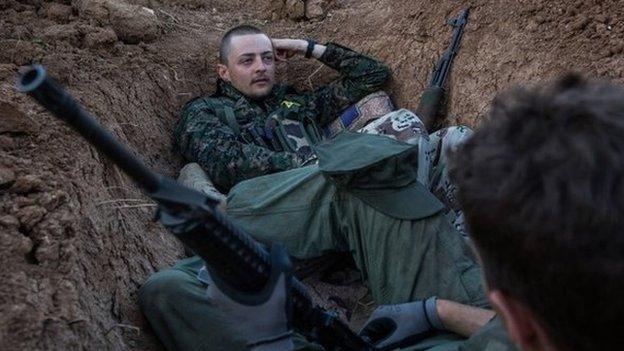IS-fighting British man Jac Holmes killed in Syria
- Published
Jac Holmes told the BBC why he went to fight IS, in an interview recorded weeks before he was killed
A British man who has been fighting so-called Islamic State in Syria has been killed while clearing landmines in Raqqa, the BBC understands.
Jac Holmes had been fighting with Kurdish militia the YPG since 2015.
Kurdish representatives in the UK said they had been told by YPG officials the former IT worker from Bournemouth was killed while he was clearing an area to make it safe for civilians.
His mother, Angie Blannin, said the 24-year-old was a "hero in my eyes".
She told the BBC: "He loved what he was doing there, he loved being a soldier. He had the courage of his convictions.
Just a boy
"He was just a boy when he left the UK, a little bit lost. He told me he didn't know what he wanted to do with his life. But by going out there, he found something that he was good at and that he loved."
Ms Blannin, from Dover, Kent, said she had not seen Jac for over a year, but that they regularly kept in touch online and had been making plans for him coming home.
Speaking in 2015, Jac Holmes' mother, Angie Blannin, said her son was a "grown man who makes his own decisions"
"He stuck by his convictions because he wanted to be there and he wanted to see the end of Raqqa and to see the end of the caliphate. That was a moment in history, and he wanted to be part of it."
"We thought with any luck he'd be home for Christmas. It had been so tough since he had been away but I was always 100% behind him."
"After all this, he had said he might go into politics, or perhaps into close protection security. He'd seen so much for a boy of his age."
Ozkan Ozdil, who also fought with Mr Holmes in Syria, told the BBC his friend had become well-known and respected among Kurdish fighting units.
He said: "Everybody knew Jac. By his third tour out there his Kurdish was fluent. We had a bit of a laugh that he was my Kurdish translator.
"He spoke so fondly about Rojava [the name given to the Kurdish region of north east Syria]. He was the reason that made me want to go."
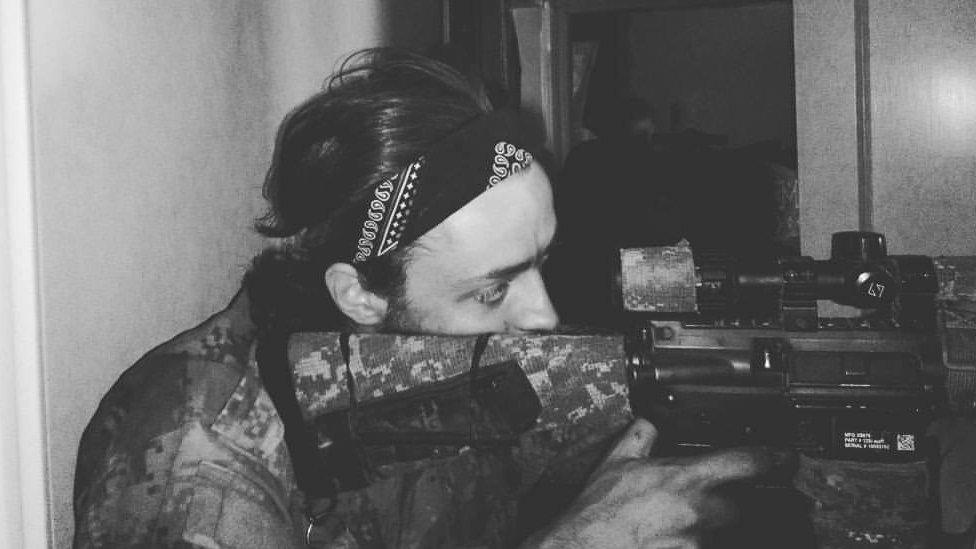
During the battle for the IS stronghold of Raqqa, Mr Holmes became part of a four-man sniper unit
Mr Holmes also was known by his Kurdish nom de guerre Sores Amanos - "sores" meaning "revolution".
He was one of a number of British volunteers who travelled out to fight against IS with the Kurds during the Syrian conflict.
As a former IT worker, Mr Holmes had no prior military training, but he became one of the longest-serving foreign volunteers in the conflict.
Since 2015, he had travelled to fight with the Kurds three times, and spent more than a year there on his third trip.
"He loved being out there, he loved the people around him. He had a purpose and he was happy," said Mr Ozdil.
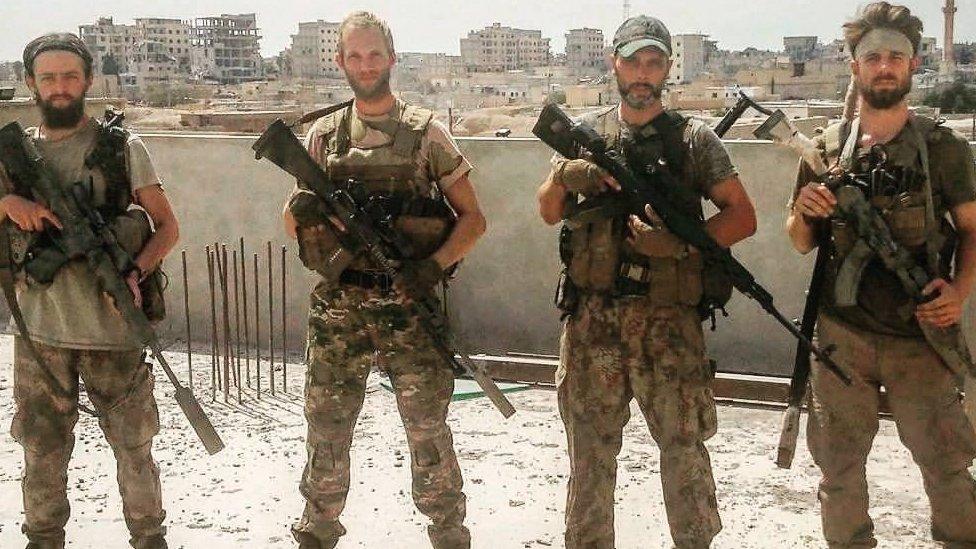
Mr Holmes (far left) had been sharing pictures and videos of his experiences in Syria on Facebook
Mr Holmes fought in operations to push IS out of key towns and villages including Tel Hamis, Manbij, Tabqa and Raqqa.
He always knew he could face arrest from UK authorities for fighting abroad, but had previously told the BBC "you just have to hope that our justice system works in the correct way".
During the battle for the IS stronghold of Raqqa, he became part of a four-man sniper unit made up of international fighters who, like him, had joined the conflict voluntarily.
In the "223 YPG Sniper Unit" Mr Holmes fought alongside three others from Spain, the US and Germany.
As the fighting for Raqqa intensified, the unit had some narrow escapes.
He described on Facebook how they had survived coming close to IS car bombs and being ambushed by jihadist fighters.
On Sunday, Mr Holmes posted video of himself on Facebook walking into Raqqa's central sports stadium for the first time since the battle for the city ended.
He wrote: "We spent weeks seeing this place from hundreds of metres away. It was strange walking the streets and finally going inside."
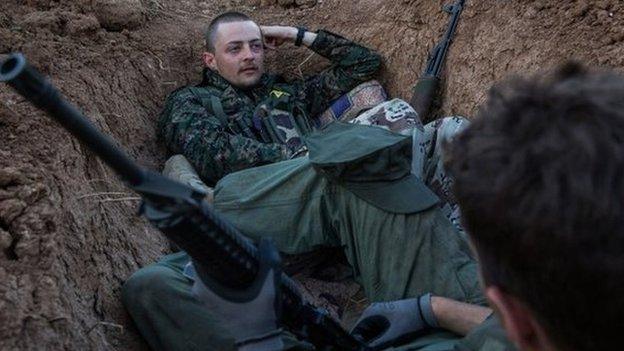
Mr Holmes was photographed guarding a post in north west Syria with the YPG
During his time in Syria, he conducted many interviews with various media outlets, even appearing on Kurdish television outlets giving interviews in Kurdish.
Through his media appearances and the amount of interest in the exploits of this young man from Bournemouth, Mr Holmes drew wider attention to the role the Kurds were playing in the conflict.
Another friend from London, Alan Sahin, told the BBC: "We could see how much he grew up while he was out there. He found his purpose there. He turned from a young lad into a man."
'Respect, admiration'
He described how a close circle had had the news of his death relayed to them from Syria just as they were attending Parliament on Monday evening for a Kurdish event.
"It's gut-wrenching, as Raqqa had just finished," said Mr Sahin. "Jac would have gone on to do good things."
The Home Office has warned against all travel to Syria.
Other former British YPG fighters, along with others who knew Mr Holmes, gathered at the Kurdish Community Centre on Monday evening to pay tribute to their friend and comrade.
Mr Sahin said "At his age, to go into a war zone with no experience, ask anyone else in Britain and they'd say you're insane. But there he was, he went out there and was doing it. Even though he knew the danger, you couldn't help but feel he was brave. I had respect for him, admiration even."
- Published7 October 2017
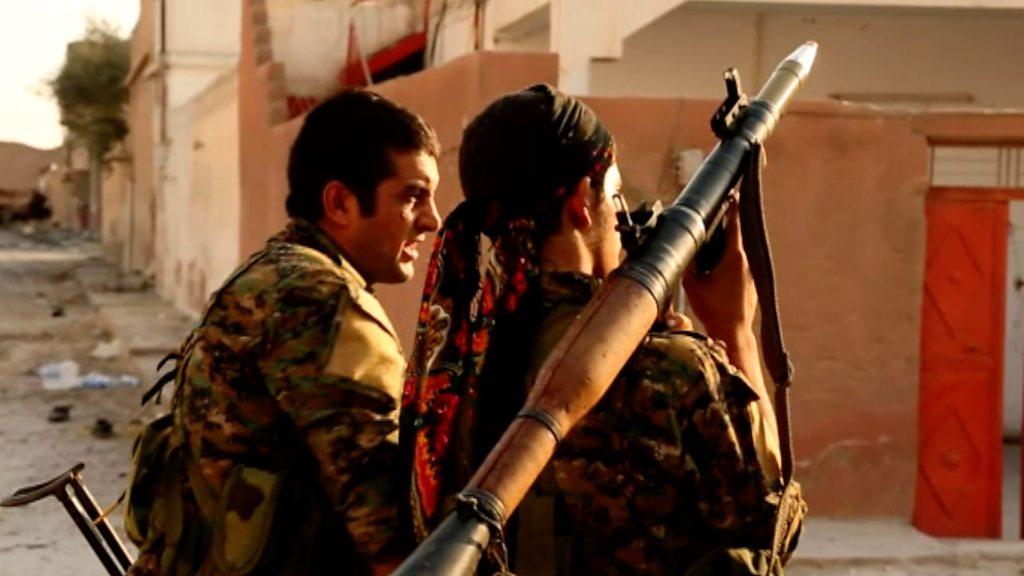
- Published24 April 2016
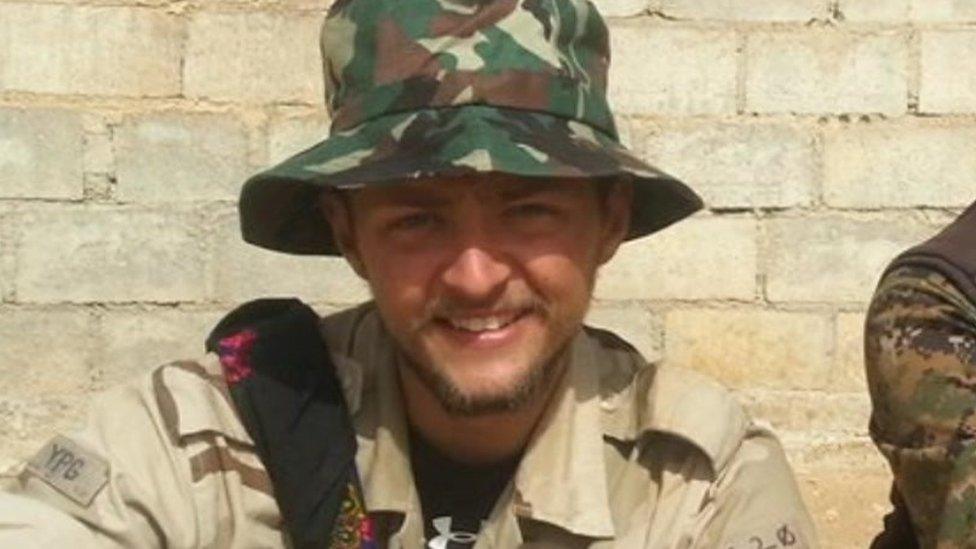
- Published14 May 2015
